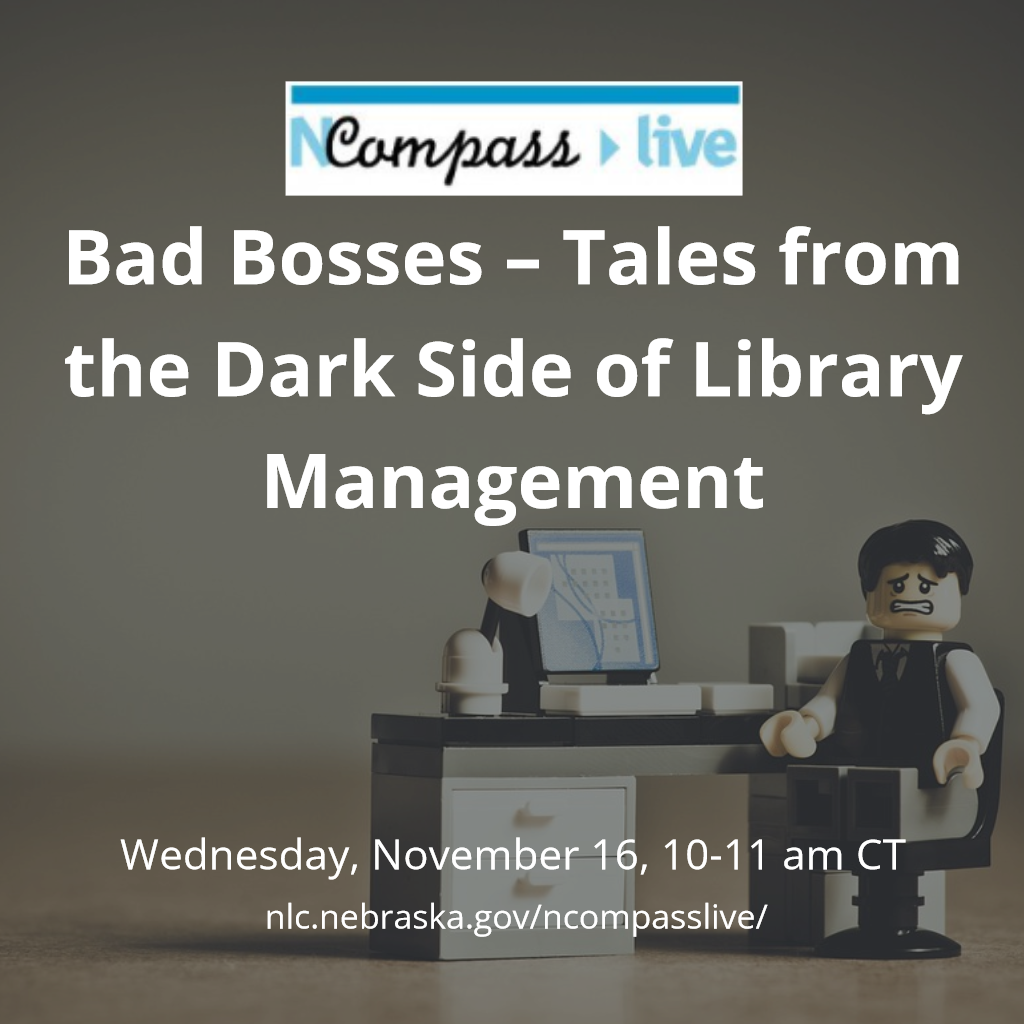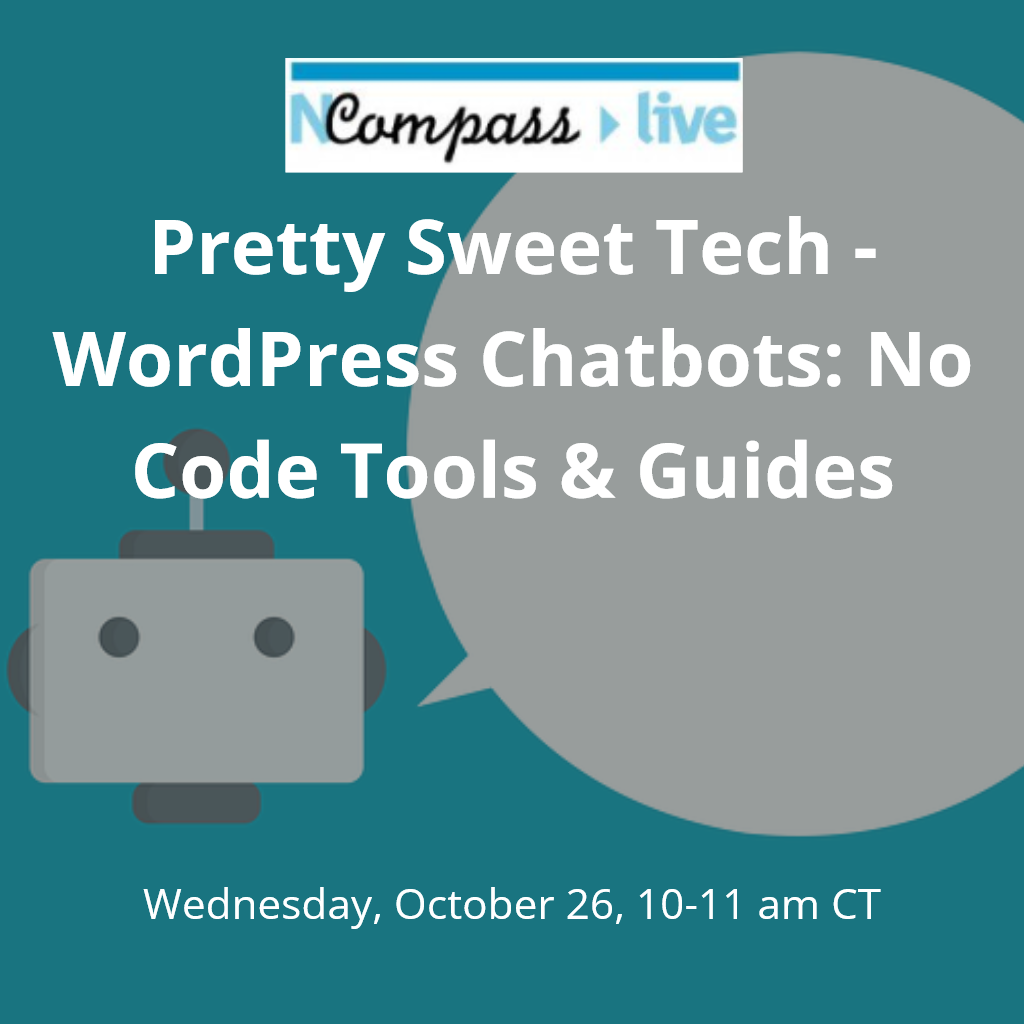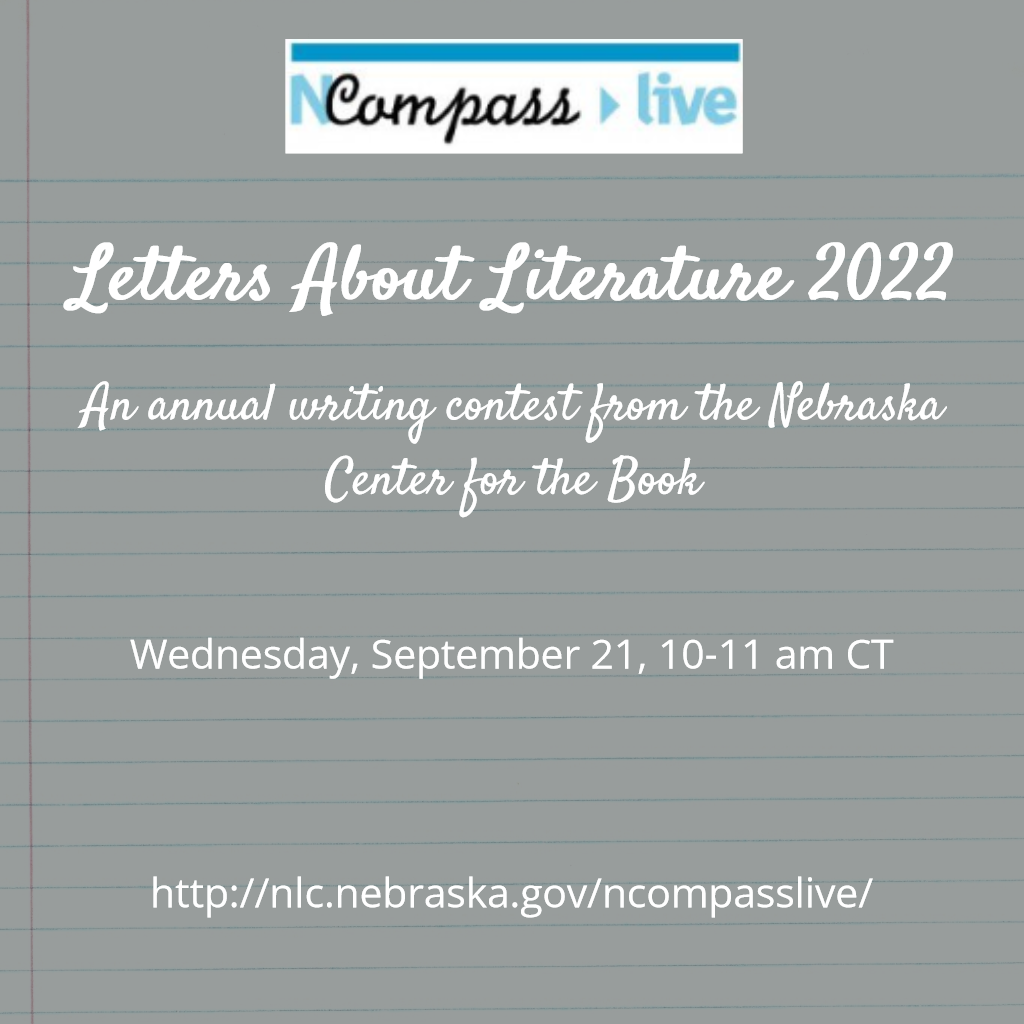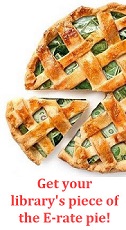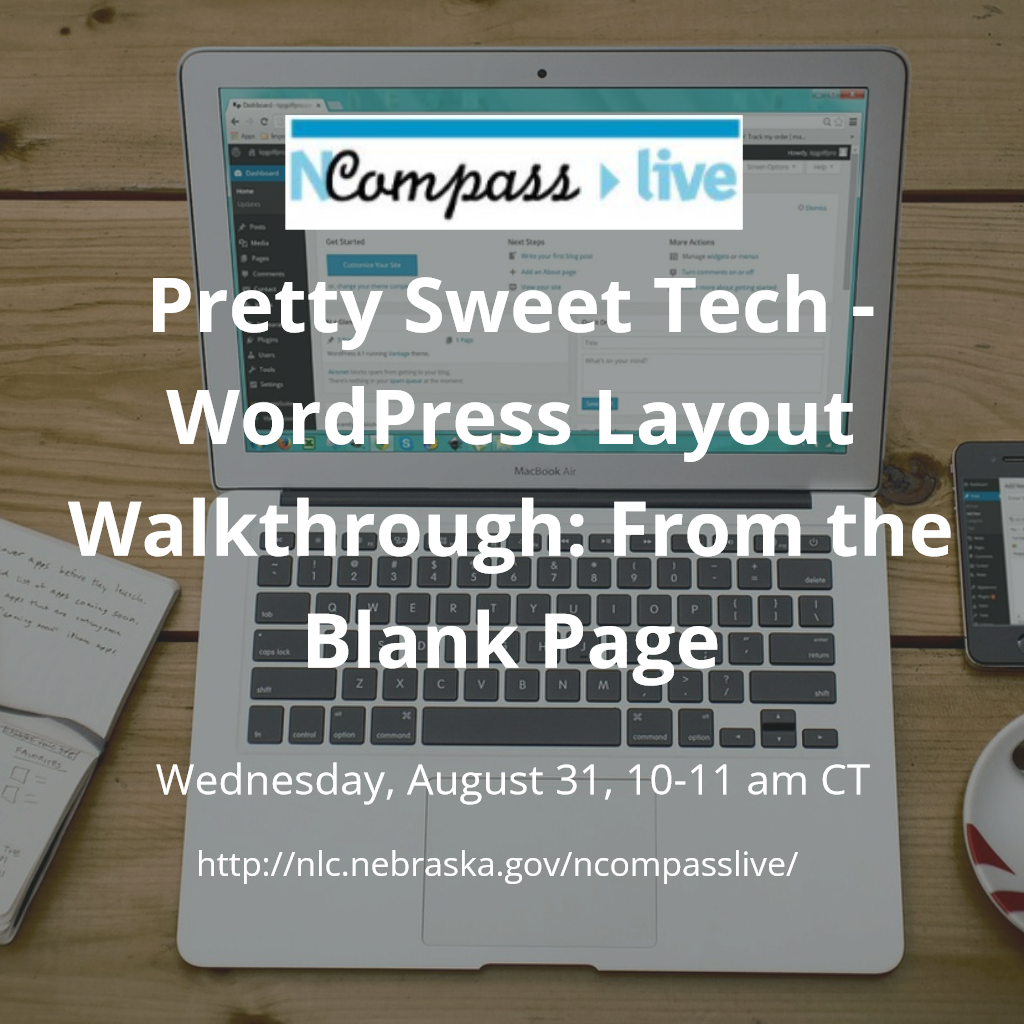Search the Blog
Categories
- Books & Reading
- Broadband Buzz
- Census
- Education & Training
- General
- Grants
- Information Resources
- Library Management
- Nebraska Center for the Book
- Nebraska Libraries on the Web
- Nebraska Memories
- Now hiring @ your library
- Preservation
- Pretty Sweet Tech
- Programming
- Public Library Boards of Trustees
- Public Relations
- Talking Book & Braille Service (TBBS)
- Technology
- Uncategorized
- What's Up Doc / Govdocs
- Youth Services
Archives
Subscribe
Category Archives: Education & Training
NCompass Live: Bad Bosses – Tales from the Dark Side of Library Management
Join us to hear about ‘Bad Bosses – Tales from the Dark Side of Library Management’ on next week’s NCompass Live webinar on Wednesday, November 16, at 10am CT.
Bad management in libraries can create a toxic environment for employees and patrons. Management is hard to teach and even more difficult to do well. I discuss the different types of bad management I’ve experienced in libraries, how I and my fellow staff members dealt with it, what we should have done instead, and how some of what I experienced informed my management style going forward.
Presenter: Brooke Zarco, Director, Blair (NE) Public Library & Technology Center.

Upcoming NCompass Live shows:
- Nov. 23 – Best New Children’s Books of 2022
- Nov. 30 – Pretty Sweet Tech
- Dec. 21 – Summer Reading Program 2023: All Together Now
- Jan. 11, 2023 – Best New Teen Reads of 2022
- Jan. 18, 2023 – First Amendment Audits: What You Need to Know
For more information, to register for NCompass Live, or to listen to recordings of past events, go to the NCompass Live webpage.
NCompass Live is broadcast live every Wednesday from 10am – 11am Central Time. Convert to your time zone on the Official U.S. Time website. The show is presented online using the GoToWebinar online meeting service. Before you attend a session, please see the NLC Online Sessions webpage for detailed information about GoToWebinar, including system requirements, firewall permissions, and equipment requirements for computer speakers and microphones.
NCompass Live: Reach Your Military-Affiliated Patrons with the Libraries & Veterans Toolkit
Learn about the Libraries & Veterans Toolkit on next week’s NCompass Live webinar on Wednesday, November 9, at 10am CT.
The Libraries & Veterans Toolkit is a searchable and browsable guide of military-affiliated outreach ideas ready for implementation at academic, public, school, state, and VA and military libraries. Join project director, librarian, and Army veteran Sarah LeMire and Nebraska librarian and committee member Tammi Owens as they discuss the IMLS-funded project. After attending this seminar, attendees will be able to use the Toolkit to implement outreach events for military-affiliated patrons, submit their own events to the Toolkit, and gain insight on how and why to serve, support, and celebrate military-affiliated students and patrons at all libraries.

Upcoming NCompass Live shows:
- Nov. 16 – Bad Bosses – Tales from the Dark Side of Library Management
- Nov. 23 – Best New Children’s Books of 2022
- Nov. 30 – Pretty Sweet Tech
- Dec. 21 – Summer Reading Program 2023: All Together Now
- Jan. 11, 2023 – Best New Teen Reads of 2022
- Jan. 18, 2023 – First Amendment Audits: What You Need to Know
For more information, to register for NCompass Live, or to listen to recordings of past events, go to the NCompass Live webpage.
NCompass Live is broadcast live every Wednesday from 10am – 11am Central Time. Convert to your time zone on the Official U.S. Time website. The show is presented online using the GoToWebinar online meeting service. Before you attend a session, please see the NLC Online Sessions webpage for detailed information about GoToWebinar, including system requirements, firewall permissions, and equipment requirements for computer speakers and microphones.
What’s Up Doc? New State Agency Publications at the Nebraska Library Commission
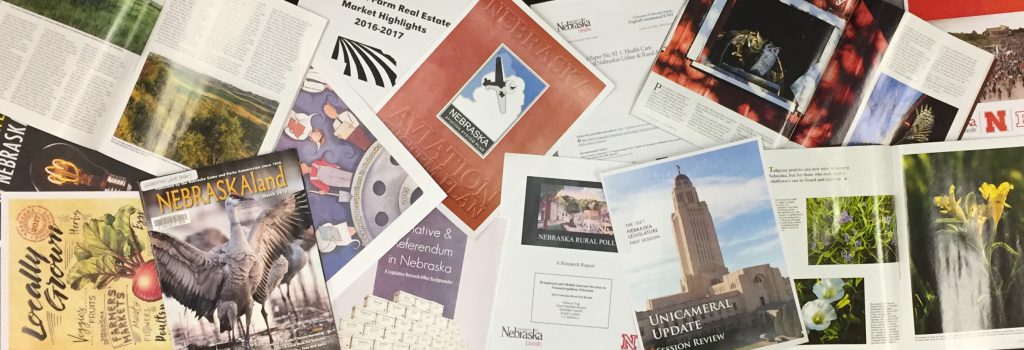
New state agency publications have been received at the Nebraska Library Commission for September and October, 2022. Included are reports from the Nebraska Department of Environment and Energy, the Nebraska Emergency Management Agency, the Nebraska Civil Defence Agency, the Nebraska Department Transportation, and new books from the University of Nebraska Press, to name a few.
Most items, except the books from the University of Nebraska Press, are available for immediate viewing and printing by clicking on the highlighted link above, or directly in the .pdf below. You can read synopses of the books received from the University of Nebraska Press in the Book Briefs blogposts.
The Nebraska Legislature created the Nebraska Publications Clearinghouse in 1972 as a service of the Nebraska Library Commission. Its purpose is to collect, preserve, and provide access to all public information published by Nebraska state agencies. By law (State Statutes 51-411 to 51-413) all Nebraska state agencies are required to submit their published documents to the Clearinghouse. For more information, visit the Nebraska Publications Clearinghouse page, contact Mary Sauers, Government Information Services Librarian; or contact Bonnie Henzel, State Documents Staff Assistant.
Book Briefs: New University of Nebraska Press Books at the Nebraska Publications Clearinghouse
The Nebraska Publications Clearinghouse receives documents every month from all Nebraska state agencies, including the University of Nebraska Press (UNP). Each month we will be showcasing the UNP books that the Clearinghouse has received.
UNP books, as well as all Nebraska state documents, are available for checkout by libraries and librarians for their patrons.
Here are the UNP books the Clearinghouse received in September and October, 2022:
An Evolving Vision : The James Collection, 1997-2022, by Carolyn Ducey, Marin F. Hanson, and Penny McMorris.
In 2022 the International Quilt Museum (IQM) at the University of Nebraska–Lincoln celebrates a quarter century of studying, preserving, and exhibiting the Ardis and Robert James Collection. The Jameses’ donation of their unparalleled one-thousand-piece collection in 1997 established the IQM and formed the solid base from which the museum has steadily grown. Today, the museum’s collection includes more than six thousand quilts from five different centuries and over fifty countries, an expansion that has been encouraged by the James family, who continue to support the museum’s efforts to represent global quiltmaking.
This companion publication to the exhibition An Evolving Vision, 1997–2022 highlights important pieces from various segments of the collection: Classics—stunning antique American quilts; From the Studio—early and innovative art pieces; and New Horizons—quilt traditions from around the world. This book also includes a comprehensive catalog of the James Collection, comprising the quilts from the original 1997 gift as well as important groups given to the IQM in 2006 and 2009. An Evolving Vision documents the significance of the James Collection and underscores the broad vision its collectors developed not only for themselves but for the museum they so vitally helped shape.
The Enlightened Patrolman : Early Law Enforcement in Mexico City, by Nicole von Germeten; Series: Confluencias
When late eighteenth-century New Spanish viceregal administrators installed public lamps in the streets of central Mexico City, they illuminated the bodies of Indigenous, Afro-descended, and plebeian Spanish urbanites. The urban patrolmen, known as guarda faroleros, or “lantern guards,” maintained the streetlamps and attempted to clear the streets of plebeian sexuality, embodiment, and sociability, all while enforcing late colonial racial policies amid frequent violent resistance from the populace.
In The Enlightened Patrolman Nicole von Germeten guides readers through Mexico City’s efforts to envision and impose modern values as viewed through the lens of early law enforcement, an accelerated process of racialization of urban populations, and burgeoning ideas of modern masculinity. Germeten unfolds a tale of the losing struggle for elite control of the city streets. As surveillance increased and the populace resisted violently, a pause in the march toward modernity ensued. The Enlightened Patrolman presents an innovative study on the history of this very early law enforcement corps, providing new insight into the history of masculinity and race in Mexico, as well as the eighteenth-century origins of policing in the Americas.
Imperial Zions : Religion, Race, and Family in the American West and the Pacific, by Amanda Hendrix-Komoto; Series: Studies in Pacific Worlds
In the nineteenth century, white Americans contrasted the perceived purity of white, middle-class women with the perceived eroticism of women of color and the working classes. The Latter-day Saint practice of polygamy challenged this separation, encouraging white women to participate in an institution that many people associated with the streets of Calcutta or Turkish palaces. At the same time, Latter-day Saints participated in American settler colonialism. After their expulsion from Ohio, Missouri, and Illinois, Latter-day Saints dispossessed Ute and Shoshone communities in an attempt to build their American Zion. Their missionary work abroad also helped to solidify American influence in the Pacific Islands as the church became a participant in American expansion.
Imperial Zions explores the importance of the body in Latter-day Saint theology with the faith’s attempts to spread its gospel as a “civilizing” force in the American West and the Pacific. By highlighting the intertwining of Latter-day Saint theology and American ideas about race, sexuality, and the nature of colonialism, Imperial Zions argues that Latter-day Saints created their understandings of polygamy at the same time they tried to change the domestic practices of Native Americans and other Indigenous peoples. Amanda Hendrix-Komoto tracks the work of missionaries as they moved through different imperial spaces to analyze the experiences of the American Indians and Native Hawaiians who became a part of white Latter-day Saint families. Imperial Zions is a foundational contribution that places Latter-day Saint discourses about race and peoplehood in the context of its ideas about sexuality, gender, and the family.
Living Room, by Laura Bylenok; Series: The Backwaters Prize in Poetry
Deeply phenomenological and ecological, Laura Bylenok’s poems in Living Room imagine the lived reality of other organisms and kinds of life, including animals, plants, bacteria, buildings, and rocks. They explore the permeability of human and nonhuman experience, intelligence, language, and subjectivity. In particular, the poems consider so-called model organisms—nonhuman species studied to understand specific and often human biological processes, diseases, and phenomena—as well as an experience of self and world that cannot be objectively quantified. The impulse of these poems is to slow down, to see and feel, and to listen closely. Language becomes solid, palpable as fruit. Long lines propel breath and push past the lung’s capacity.
Life at a cellular level, synthesis and symbiosis, is revealed through forests, fairy tales, and vines that grow over abandoned houses and hospital rooms. A living room is considered as a room that is lived in and also a room that is alive. Cells are living rooms. A self is a room that shares walls with others. Interconnection and interplay are thematic, and the network of poems becomes a linguistic rendering of a heterogeneous and nonhierarchical ecosystem, using the language of biology, genetics, and neurochemistry alongside fairy tale and dream to explore the interior spaces of grief, motherhood, mortality, and self.
Might Kindred, by Monica Gomery; Series: The Raz/Shumaker Prairie Schooner Book Prize in Poetry
The poems of Might Kindred wonder aloud: can we belong to one another, and “can a people belong to a dreaming machine?” Conjuring mountains and bodies of water, queer and immigrant poetics, beloveds both human and animal, Mónica Gomery explores the intimately personal and the possibility of a collective voice. Here anthems are sung and fall apart midsong. The speaker exchanges letters with her ancestors, is visited by a shadow sister, and interrogates what it means to make a home as a first-generation American.
Winner of the Raz/Shumaker Prairie Schooner Book Prize in Poetry, the poems in Might Kindred are rooted in the body and its cousins, seeking the possibility of kinship, “in case we might kindness, might ardor together.” Belonging and unbelonging are claimed as part of the same complicated whole, and Gomery’s intersections reach for something divine at the center.
Nez Perce Summer, 1877 : The U.S. Army and the Nee-Me-Poo Crisis, by Jerome A. Greene
Nez Perce Summer, 1877 tells the story of a people’s epic struggle to survive spiritually, culturally, and physically in the face of unrelenting military force. Written by one of the foremost experts in frontier military history, Jerome A. Greene, and reviewed by members of the Nez Perce tribe, this definitive treatment of the Nez Perce War is the first to incorporate research from all known accounts of Nez Perce and U.S. military participants.
Enhanced by sixteen detailed maps and forty-nine historic photographs, Greene’s gripping narrative takes readers on a three-and-one-half month 1,700-mile journey across the wilds of Idaho, Wyoming, and Montana territories. All of the skirmishes and battles of the war receive detailed treatment, which benefits from Greene’s astute analysis of the strategies and decision making on both sides.
Between 100 and 150 of the more than 800 Nez Perce men, women, and children who began the trek were killed during the war. Almost as many died in the months following the surrender, after they were exiled to malaria-ridden northeastern Oklahoma. Army deaths numbered 113. The casualties on both sides were an extraordinary price for a war that nobody wanted but whose history has since fascinated generations of Americans.
The North American West in the Twenty-First Century, edited by Brenden W. Rensink
In 1893 Frederick Jackson Turner famously argued that the generational process of meeting and conquering the supposedly uncivilized western frontier is what forged American identity. In the late twentieth century, “new western” historians dissected the mythologized western histories that Turner and others had long used to embody American triumph and progress. While Turner’s frontier is no more, the West continues to present America with challenging processes to wrestle, navigate, and overcome.
The North American West in the Twenty-First Century, edited by Brenden W. Rensink, takes stories of the late twentieth-century “modern West” and carefully pulls them toward the present—explicitly tracing continuity with or unexpected divergence from trajectories established in the 1980s and 1990s. Considering a broad range of topics, including environment, Indigenous peoples, geography, migration, and politics, these essays straddle multiple modern frontiers, not least of which is the temporal frontier between our unsettled past and uncertain future. These forays into the twenty-first-century West will inspire more scholars to pull histories to the present and by doing so reinsert scholarly findings into contemporary public awareness.
The Old Iron Road : An Epic of Rails, Roads, and the Urge to Go West, by David Haward Bain
In the summer of 2000 David Haward Bain and his family left their home in Vermont and headed west in search of America’s past. Spiritually, their journey began on a Kansas trail where the author’s grandmother was born in a covered wagon in 1889. Between the Missouri River and the Golden Gate, they retraced the entire route of the first transcontinental railroad and large stretches of the Oregon and California trails, and the equally colorful old Lincoln Highway. Following vanished iron rails and wagon wheel ruts, bumping down backroads and main streets, they discovered the deep, restless, uniquely American spirit of adventure that connects our past to our present.
A superb writer and an exacting researcher, Bain conjures up a marvelous sense of coming unstuck in time as he lingers in the ghost towns and battlegrounds, prairies and river ports, trainyards, museums, deserts, and diners that line his cruise west to California. Bain encounters a fascinating cast of characters, both historic and contemporary, as well as memories of his grandparents and the journeys that shaped his own heritage.
Writing in the tradition of William Least Heat-Moon and Ian Frazier, and with an engaging warmth and a deep grasp of history all his own, Bain has fashioned a quintessentially American journey.
Outback & Out West : The Settler-Colonial Environmental Imaginery, by Tom Lynch.
Outback and Out West examines the ecological consequences of a settler-colonial imaginary by comparing expressions of settler colonialism in the literature of the American West and Australian Outback. Tom Lynch traces exogenous domination in both regions, which resulted in many similar means of settlement, including pastoralism, homestead acts, afforestation efforts, and bioregional efforts at “belonging.” Lynch pairs the two nations’ texts to show how an analysis at the intersection of ecocriticism and settler colonialism requires a new canon that is responsive to the social, cultural, and ecological difficulties created by settlement in the West and Outback.
Outback and Out West draws out the regional Anthropocene dimensions of settler colonialism, considering such pressing environmental problems as habitat loss, groundwater depletion, and mass extinctions. Lynch studies the implications of our settlement heritage on history, art, and the environment through the cross-national comparison of spaces. He asserts that bringing an ecocritical awareness to settler-colonial theory is essential for reconciliation with dispossessed Indigenous populations as well as reparations for ecological damages as we work to decolonize engagement with and literature about these places.
Paternalism to Partnership : The Administration of Indian Affairs, 1786-2021, by David H. DeJong
Paternalism to Partnership examines the administration of Indian affairs from 1786, when the first federal administrator was appointed, through 2021. David H. DeJong examines each administrator through a biographical sketch and excerpts of policy statements defining the administrator’s political philosophy, drawn from official reports or the administrator’s own writings.
The Indian Office, as an executive agency under the secretary of war (1789 to 1849) and secretary of the interior (1849 to present), was directed by the president of the United States. The superintendents, chief clerks, commissioners, and assistant secretaries for Indian affairs administered policy as prescribed by Congress and the president. Each was also given a level of discretion in administering this policy. For most of the federal-Indian relationship, administrators were limited in influencing policy. This paternalism continued well into the twentieth century. Beginning in the 1960s Congress and the president ameliorated their views on the federal-Indian relationship and moved away from paternalism. Since 1966 every administrator of the Bureau of Indian Affairs has been Native American, and each has exercised increasing authority in shaping policy. This has given rise to a federal-Indian partnership that has witnessed tribal nations again exercising their inherent rights of self-government.
In this documentary history David H. DeJong follows the progression of federal Indian policy over more than two hundred years, providing firsthand accounts of how the federal-Indian relationship has changed over the centuries.
The Settler Sea : California’s Salton Sea and the Consequences of Colonialism, by Traci Brynne Voyles
2022 WHA Caughey Western History Prize for the most distinguished book on the American West
Can a sea be a settler? What if it is a sea that exists only in the form of incongruous, head-scratching contradictions: a wetland in a desert, a wildlife refuge that poisons birds, a body of water in which fish suffocate? Traci Brynne Voyles’s history of the Salton Sea examines how settler colonialism restructures physical environments in ways that further Indigenous dispossession, racial capitalism, and degradation of the natural world. In other words, The Settler Sea asks how settler colonialism entraps nature to do settlers’ work for them.
The Salton Sea, Southern California’s largest inland body of water, occupies the space between the lush agricultural farmland of the Imperial Valley and the austere desert called “America’s Sahara.” The sea sits near the boundary between the United States and Mexico and lies at the often-contested intersections of the sovereign lands of the Torres Martinez Desert Cahuilla and the state of California. Created in 1905, when overflow from the Colorado River combined with a poorly constructed irrigation system to cause the whole river to flow into the desert, this human-maintained body of water has been considered a looming environmental disaster.
The Salton Sea’s very precariousness—the way it sits uncomfortably between worlds, existing always in the interstices of human and natural influences, between desert and wetland, between the skyward pull of the sun and the constant inflow of polluted water—is both a symptom and symbol of the larger precariousness of settler relationships to the environment, in the West and beyond. Voyles provides an innovative exploration of the Salton Sea, looking to the ways the sea, its origins, and its role in human life have been vital to the people who call this region home.
Standing Bear’s Quest for Freedom : The First Civil Rights Victory for Native Americans, by Lawrence A. Dwyer
Chief Standing Bear of the Ponca Nation faced arrest for leaving the U.S. government’s reservation, without its permission, for the love of his son and his people. Standing Bear fought for his freedom not through armed resistance but with bold action, strong testimony, and heartfelt eloquence. He knew he and his people had suffered a great injustice.
Standing Bear wanted the right to live and die with his family on the beloved land of his Ponca ancestors, located within the Great Plains of Nebraska. In telling his story, Standing Bear’s Quest for Freedom relates an unprecedented civil rights victory for Native Americans: for the first time, in 1879, a federal court declared a Native American to be a “person”—a human being with the right to file an action for a redress of grievances in a federal court, like every other person in the United States.
Standing Bear’s victory in Standing Bear v. Crook began a national movement of reforming Native American rights—albeit a slow one. Because of the courage and leadership of Chief Standing Bear, the pervasive spirit of indifference of most Americans toward Native Americans was disrupted by this historic decision. America would never be the same.
Strength From the Waters : A History of Indigenous Mobilization in Northwest Mexico, by James V. Mestaz
Strength from the Waters is an environmental and social history that frames economic development, environmental concerns, and Indigenous mobilization within the context of a timeless issue: access to water. Between 1927 and 1970 the Mayo people—an Indigenous group in northwestern Mexico—confronted changing access to the largest freshwater source in the region, the Fuerte River.
In Strength from the Waters James V. Mestaz demonstrates how the Mayo people used newly available opportunities such as irrigation laws, land reform, and cooperatives to maintain their connection to their river system and protect their Indigenous identity. By using irrigation technologies to increase crop production and protect lands from outsiders trying to claim it as fallow, the Mayo of northern Sinaloa simultaneously preserved their identity by continuing to conduct traditional religious rituals that paid homage to the Fuerte River. This shift in approach to both new technologies and natural resources promoted their physical and cultural survival and ensured a reciprocal connection to the Fuerte River, which bound them together as Mayo.
Mestaz examines this changing link between hydraulic technology and Mayo tradition to reconsider the importance of water in relation to the state’s control of the river and the ways the natural landscape transformed relations between individuals and the state, altering the social, political, ecological, and ethnic dynamics within several Indigenous villages. Strength from the Waters significantly contributes to contemporary Mexicanist scholarship by using an environmental and ethnohistorical approach to water access, Indigenous identity, and natural resource management to interrogate Mexican modernity in the twentieth century.
There Where It’s So Bright in Me, by Tanella Boni; Series: African Poetry Book
There Where It’s So Bright in Me pries at the complexities of difference—race, religion, gender, nationality—that shape twenty-first-century geopolitical conditions. With work spanning more than thirty-five years and as one of the most prominent figures in contemporary African literature, Tanella Boni is uniquely positioned to test the distinctions of self, other, and belonging. Two twenty-first-century civil wars have made her West African home country of Côte d’Ivoire unstable. Abroad in the United States, Boni confronts the racialized violence that accompanies the idea of Blackness; in France, a second home since her university days, Boni encounters the nationalism roiling much of Europe as the consequences of (neo)colonialism shift the continent’s ethnic and racial profile.
What would it mean for the borders that segregate—for these social, political, cultural, personal, and historicizing forces that enshroud us—to lose their dominion? In a body under constant threat, how does the human spirit stay afloat? Boni’s poetry is characterized by a hard-earned buoyancy, given her subject matter. Her empathy, insight, and plainspoken address are crucial contributions to the many difficult contemporary conversations we must engage.
**Pictures and Synopses courtesy of University of Nebraska Press.
NCompass Live: Power Up With Documents: E-Documents in the Classroom
Learn how K-16 students can access and use free government documents online on next week’s NCompass Live webinar on Wednesday, November 2, at 10am CT.
Too often government documents are overlooked as sources for K-16 students. But for schools with limited resources, documents are the perfect place to find information. Best of all, they are freely accessible with an internet connection. Calvin T. Ryan Library is a selective depository in the Federal Depository Library Program and has been for over 60 years! This presentation will focus on the variety of ways to locate these treasures. Some sites are grade-specific! There will also be a libguide of Nebraska and federal documents your library can share to help your students find information. Are you up for the challenge?
Presenter: Rochelle Hunt Reeves, Associate Professor, Curriculum/OER/Government Documents Librarian, Calvin T. Ryan Library, University of Nebraska at Kearney.

Upcoming NCompass Live shows:
- Nov. 9 – Reach Your Military-Affiliated Patrons with the Libraries & Veterans Toolkit
- Nov. 23 – Best New Children’s Books of 2022
- Nov. 30 – Pretty Sweet Tech
- Dec. 21 – Summer Reading Program 2023: All Together Now
- Jan. 11, 2023 – Best New Teen Reads of 2022
- Jan. 18, 2023 – First Amendment Audits: What You Need to Know
For more information, to register for NCompass Live, or to listen to recordings of past events, go to the NCompass Live webpage.
NCompass Live is broadcast live every Wednesday from 10am – 11am Central Time. Convert to your time zone on the Official U.S. Time website. The show is presented online using the GoToWebinar online meeting service. Before you attend a session, please see the NLC Online Sessions webpage for detailed information about GoToWebinar, including system requirements, firewall permissions, and equipment requirements for computer speakers and microphones.
Posted in Education & Training, What's Up Doc / Govdocs, Youth Services
Tagged NCompLive
Leave a comment
NCompass Live: Pretty Sweet Tech – WordPress Chatbots: No Code Tools & Guides
Do you get really repetitive questions at your library? Hours? Address? Learn how to use a WordPress Chatbot to help manage these common questions on next week’s NCompass Live webinar on Wednesday, October 26 at 10am CT.
Special monthly episodes of NCompass Live! Join the NLC’s Technology Innovation Librarian, Amanda Sweet, as she guides us through the world of library-related Pretty Sweet Tech.
Library staff are already too overworked to answer the same questions over and over again. This session will help you set up a chatbot on your library’s website to relieve some of the burden. We will use the free Tidio plugin on WordPress to walk through a quick setup.
By the end of this session you will:
- Have a list of common chatbot planning questions.
- Identify different levels of chatbot services, from easy to complex
- See a simple chatbot in action
I hope to see you there!

Upcoming NCompass Live shows:
- Nov. 9 – Reach Your Military-Affiliated Patrons with the Libraries & Veterans Toolkit
- Nov. 23 – Best New Children’s Books of 2022
- Nov. 30 – Pretty Sweet Tech
- Dec. 21 – Summer Reading Program 2023: All Together Now
- Jan. 11, 2023 – Best New Teen Reads of 2022
For more information, to register for NCompass Live, or to listen to recordings of past events, go to the NCompass Live webpage.
NCompass Live is broadcast live every Wednesday from 10am – 11am Central Time. Convert to your time zone on the Official U.S. Time website. The show is presented online using the GoToWebinar online meeting service. Before you attend a session, please see the NLC Online Sessions webpage for detailed information about GoToWebinar, including system requirements, firewall permissions, and equipment requirements for computer speakers and microphones.
Posted in Education & Training, Library Management, Pretty Sweet Tech, Technology
Tagged NCompLive, prettysweettech
Leave a comment
NCompass Live: NLC Grants for 2023
Do you have a program or project you would like to see funded? Learn how to apply for the ‘NLC Grants for 2023’ on next week’s NCompass Live webinar on Wednesday, October 19 at 10am CT.
The Nebraska Library Commission is making funding available for four grants for 2023: Continuing Education & Training, Internship, Library Improvement, and Youth Grants for Excellence.
Grant applications for all 2023 NLC grants are due November 18, 2022. Don’t let your library miss out on these opportunities!
Join Christa Porter, Sally Snyder, and Holli Duggan, from the Nebraska Library Commission’s Library Development Team, as they provide an overview of the grants, including eligibility requirements and grant guidelines, the application process and grant review, timelines and deadlines. They will also share some tips on writing effective grants.

Upcoming NCompass Live shows:
- Oct. 26 – Pretty Sweet Tech – WordPress Chatbots: No Code Tools & Guides
- Nov. 9 – Reach Your Military-Affiliated Patrons with the Libraries & Veterans Toolkit
For more information, to register for NCompass Live, or to listen to recordings of past events, go to the NCompass Live webpage.
NCompass Live is broadcast live every Wednesday from 10am – 11am Central Time. Convert to your time zone on the Official U.S. Time website. The show is presented online using the GoToWebinar online meeting service. Before you attend a session, please see the NLC Online Sessions webpage for detailed information about GoToWebinar, including system requirements, firewall permissions, and equipment requirements for computer speakers and microphones.
#BookFaceFriday – “Emily Hamilton & Other Writings” by Sukey Vickery
Sit a spell with this week’s #BookFaceFriday.
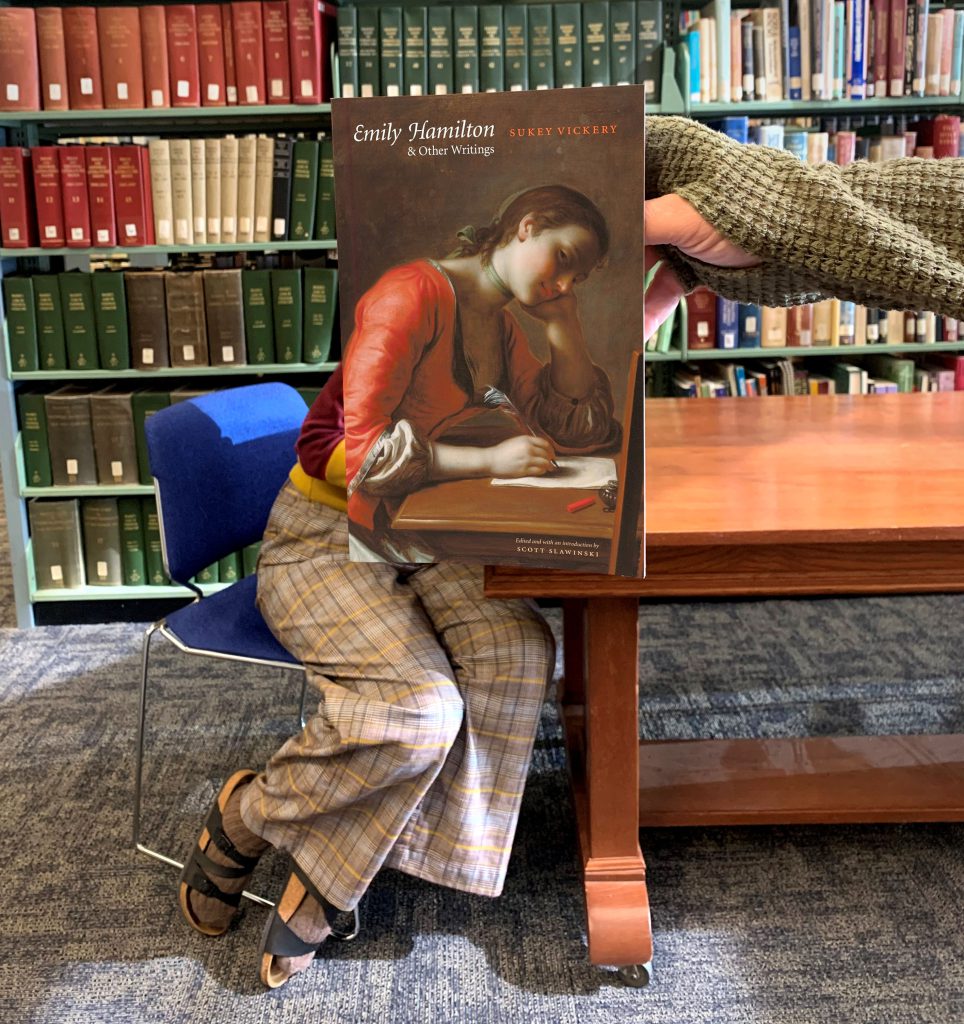
Get your thoughts down on paper just like this week’s #BookFaceFriday, “Emily Hamilton & Other Writings (Legacies of Nineteenth-Century American Women Writers)” by Sukey Vickery, edited by Scott Slawinski (University of Nebraska Press, 2009.) The Nebraska Library Commission’s Collection is always growing; the Nebraska Publications Clearinghouse receives documents every month from all Nebraska state agencies, including the University of Nebraska Press (UNP). UNP books, as well as all Nebraska state documents, are available for checkout by libraries and librarians for their patrons.
The careful editing and cogent and engaging introduction to this volume will guide students and scholars alike, thus helping Sukey Vickery’s work to receive the attention that it deserves.”
—Amy E. Winans, Women’s Studies
“Sukey Vickery’s Emily Hamilton is an epistolary novel dealing with the courtship and marriages of three women. Originally published in 1803, it is one of the earliest examples of realist fiction in America and a departure from other novels at the turn of the nineteenth century. From the outset its author intended it as a realist project, never delving into the overly sentimental plotting or characterization present in much of the writing of Vickery’s contemporaries. Emily Hamilton explores from a decidedly feminine perspective the idea of a woman’s right to choose her own spouse and the importance of female friendship. Vickery’s characterization of women further diverges from the typical eighteenth- and early nineteenth-century didactic of the righteous/sinful woman and depicts, instead, believable female characters exhibiting true-to-life behavior.”
—from the book jacket
Our model this week is a new addition to the Nebraska Library Commission! Welcome to Laura Mooney, our new Federal Documents Staff Assistant. She joins us from the History Nebraska Museum in Lincoln, as their Senior Objects Curator. Laura enjoys reading nonfiction; she’s currently reading a book about Julia Child. She prefers to read physical books, as it gives her a chance to take a break from screens. Along with reading and spending time with her 17 year old cat named Allie, her hobbies include gardening, vintage clothing, and anything related to food (experimenting in the kitchen, learning about food history, etc!) Welcome Laura!
“I’m thrilled to be joining the Nebraska Library Commission, and delighted to be part of the team that is making publications accessible online through digitization. In my first few weeks here I have been digitizing materials from the Nebraska Department of Agriculture and Department on Aging. It’s been fascinating to learn about the depth of information within these collections. There are so many resources that will be useful for scholars, historians, genealogists and more.”
Love this #BookFace & reading? Check out our past #BookFaceFriday photos on the Nebraska Library Commission’s Facebook page!
What’s Up Doc? New State Agency Publications at the Nebraska Library Commission

New state agency publications have been received at the Nebraska Library Commission for July and August 2022. Included are reports from the Nebraska Auditor of Public Accounts, the Nebraska Board of Examiners, the Nebraska Department of Education, the Nebraska Department Transportation, and new books from the University of Nebraska Press, to name a few.
Most items, except the books from the University of Nebraska Press, are available for immediate viewing and printing by clicking on the highlighted link above, or directly in the .pdf below. You can read synopses of the books received from the University of Nebraska Press in the Book Briefs blogposts.
The Nebraska Legislature created the Nebraska Publications Clearinghouse in 1972 as a service of the Nebraska Library Commission. Its purpose is to collect, preserve, and provide access to all public information published by Nebraska state agencies. By law (State Statutes 51-411 to 51-413) all Nebraska state agencies are required to submit their published documents to the Clearinghouse. For more information, visit the Nebraska Publications Clearinghouse page, contact Mary Sauers, Government Information Services Librarian; or contact Bonnie Henzel, State Documents Staff Assistant.
Book Briefs: New University of Nebraska Press Books at the Nebraska Publications Clearinghouse
The Nebraska Publications Clearinghouse receives documents every month from all Nebraska state agencies, including the University of Nebraska Press (UNP). Each month we will be showcasing the UNP books that the Clearinghouse has received.
UNP books, as well as all Nebraska state documents, are available for checkout by libraries and librarians for their patrons.
Here are the UNP books the Clearinghouse received in July and August, 2022:
Journey into Christmas, and, Star Across the Tracks, by Bess Streeter Aldrich.
The true meaning of Christmas emerges in Bess Streeter Aldrich’s two enchanting stories about reunited families, good fellowship, and restored faith. The head may tell the heart all sorts of things, but at Christmastime the heart is stronger, so take a journey back through Christmases when something quite ordinary turns out to be miraculous. Both heartfelt and genuine, the stories “Journey into Christmas” and “Star across the Tracks” remind us to cherish the holidays with those we love, the ways we grow, and the memories we make throughout life.
Mummy Eaters, by Sherry Shenoda ; Series: African Poetry Book
Winner of the Sillerman First Book Prize for African Poets, Sherry Shenoda’s collection Mummy Eaters follows in the footsteps of an imagined ancestor, one of the daughters of the house of Akhenaten in the Eighteenth Dynasty, Egypt. Shenoda forges an imagined path through her ancestor’s mummification and journey to the afterlife. Parallel to this exploration run the implications of colonialism on her passage.
The mythology of the ancient Egyptians was oriented toward resurrection through the preservation of the human body in mummification. Shenoda juxtaposes this reverence for the human body as sacred matter and a pathway to eternal life with the sixteenth- and seventeenth-century European fascination with ingesting Egyptian human remains as medicine and using exhumed Egyptian mummies as paper, paint, and fertilizer. Today Egyptian human remains are displayed in museums. Much of Mummy Eaters is written as a call and response, in the Coptic tradition, between the imagined ancestor and the author as descendant.
If This Were Fiction : A Love Story in Essays, by Jill Christman ; Series: American Lives
If This Were Fiction is a love story—for Jill Christman’s long-ago fiancé, who died young in a car accident; for her children; for her husband, Mark; and ultimately, for herself. In this collection, Christman takes on the wide range of situations and landscapes she encountered on her journey from wild child through wounded teen to mother, teacher, writer, and wife. In these pages there are fatal accidents and miraculous births; a grief pilgrimage that takes Christman to jungles, volcanoes, and caves in Central America; and meditations on everything from sexual trauma and the more benign accidents of childhood to gun violence, indoor cycling, unlikely romance, and even a ghost or two.
Playing like a lively mixtape in both subject and style, If This Were Fiction focuses an open-hearted, frequently funny, clear-eyed feminist lens on Christman’s first fifty years and sends out a message of love, power, and hope.
Vanished : Stories, by Karin Lin-Greenberg ; Series: The Raz/Shumaker Prairie Schooner Book Prize in Fiction
Winner of the Raz/Shumaker Prairie Schooner Book Prize in Fiction, Vanished tells the stories of women and girls in upstate New York who are often overlooked or unseen by the people around them. The characters range from an aging art professor whose students are uninterested in learning what she has to teach, to a young girl who becomes the victim of a cruel prank in a swimming pool, to a television producer who regrets allowing her coworkers into her mother’s bird-filled house to film a show about animal hoarding because it will reveal too much about her family and past.
Humorous and empathetic, the collection exposes the adversity in each character’s life; each deals with something or someone who has vanished—a person close to her, a friendship, a relationship—as she seeks to make sense of the world around her in the wake of that loss.
Under My Bed and Other Essays, by Jody Keisner ; Series: American Lives
Jody Keisner was raised in rural Nebraska towns by a volatile father and kind but passive mother. As a young adult living alone for the first time, she began a nighttime ritual of checking under her bed each night, not sure who she was afraid of finding. An intruder? A monster? Her father? Keisner’s fears mature as she becomes a wife and mother, and the boogeyman under the bed shape-shifts, though its shapes are no less frightening—a young aunt’s drowning, the “chest chomp” in the classic horror movie The Thing, a diagnosis of a chronic autoimmune disease, the murder of a young college student, an eccentric grandmother’s belief in reincarnation and her dying advice: “Don’t be afraid.”
In Under My Bed and Other Essays, Jody Keisner searches for the roots of the violence and fear that afflict women, starting with the working-class midwestern family she was adopted into and ending with her own experience of mothering daughters. In essays both literary and experimental, Keisner illustrates the tension between the illusion of safety, our desire for control, and our struggle to keep the things we fear from reaching out and pulling us under.
Cotton Candy : Poems Dipped Out of the Air, by Ted Kooser
“Poems dipped out of the air” describes the manner in which Ted Kooser composed the poems in Cotton Candy, the result of his daily routine of getting up long before dawn, sitting with coffee, pen, and notebook, and writing whatever drifts into his mind. Whether those words and images are serious or just plain silly, Kooser tries not to censor himself. His objective is to catch whatever comes to him, to snatch it out of the air in words, rhythms, and cadences, the way a cotton candy vendor dips an airy puff out of a cloud of spun sugar and hands it to his customer. Poems written in fun and now shared with the reader, Kooser’s playful and magical confections charm and delight.
**Pictures and Synopses courtesy of University of Nebraska Press.
‘E-rate: What’s New for 2023?’ Online Workshops Scheduled
‘E-rate: What’s New for 2023?’ workshops are now open for registration! All workshops will be held online only, via GoTo Webinar.
NOTE: This online workshop is being offered on multiple days and at varied times. The same information will be provided at each workshop, so you only need to attend one session. A recorded version will also be made available after all of the live sessions have been held.
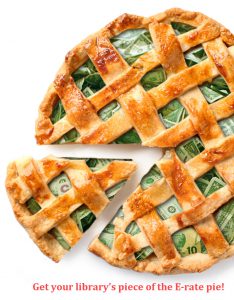
What is E-rate? How can my library benefit from E-rate? How do I apply for E-rate?
E-rate is a federal program that provides discounts to schools and public libraries on the cost of their Internet Access and Connections to make these services more affordable. This includes Broadband, Fiber, and Wi-Fi Internet access as well as Internal Connections, such as wiring, routers, switches, and other network equipment.
The E-Rate Productivity Center (EPC) is your online portal for all E-rate interactions. With your organizational account you can use EPC to file forms, track your application status, communicate with USAC, and more.
In this workshop, Christa Porter, Nebraska’s State E-rate Coordinator for Public Libraries, will explain the E-rate program and show you how to access and use your account in EPC to submit your Funding Year 2023 E-rate application. Dates and times:
- November 15 – 1:00-4:00pm Central / 12:00noon-3pm Mountain
- November 17 – 9:30am-12:30pm Central / 8:30-11:30am Mountain
- November 21 – 1:00-4:00pm Central / 12:00noon-3pm Mountain
- November 22 – 9:30am-12:30pm Central / 8:30-11:30am Mountain
To register for any of these sessions, go to the Nebraska Library Commission’s Training & Events Calendar and search for ‘e-rate 2023’.
Posted in Broadband Buzz, Education & Training, Library Management, Technology
Tagged e-rate
Leave a comment
NCompass Live: Letters About Literature 2022
Learn about Nebraska’s state reading and writing contest for youth, Letters About Literature, on this week’s NCompass Live webinar on Wednesday, September 21 at 10am CT.
The Nebraska Center for the Book is a statewide organization dedicated to the promotion of reading in all its forms. Its annual Nebraska Letters About Literature contest allows students in 4th through 12th grade to write to authors (living or deceased) about their favorite book or poem about how his or her book affected their lives. This session will provide helpful information for teachers and librarians interested in the competition. It will also cover the submission process and be an excellent opportunity to ask questions about the entire competition process. Teachers will be interested in this program that will help enhance and extend their classroom instruction.
Presenters: Tessa Terry – Communications Coordinator, Nebraska Library Commission; Richard Miller – Nebraska Center for the Book Board Member; Laurie Yocom, Director, Wilson Public Library; and Sally Snyder, Childrens’ Judge, Letters About Literature, Nebraska Library Commission.

Upcoming NCompass Live shows:
- Sept. 28 – Pretty Sweet Tech: Programming a Robot Using Voice Commands
- Oct. 5 – NO NCOMPASS LIVE THIS WEEK – ENJOY NLA!
- Oct. 12 – Navigating the New NebraskAccess
- Oct. 19 – NLC Grants for 2023
For more information, to register for NCompass Live, or to listen to recordings of past events, go to the NCompass Live webpage.
NCompass Live is broadcast live every Wednesday from 10am – 11am Central Time. Convert to your time zone on the Official U.S. Time website. The show is presented online using the GoToWebinar online meeting service. Before you attend a session, please see the NLC Online Sessions webpage for detailed information about GoToWebinar, including system requirements, firewall permissions, and equipment requirements for computer speakers and microphones.
2023 NLC Grants are Open for Applications
Do you have an idea for a program or project you would like to see funded?
The Nebraska Library Commission has made funding available for four grants for 2023: Continuing Education & Training, Internship, Library Improvement, and Youth Grants for Excellence.
Applications are being accepted for all NLC grants right now! Don’t let your library miss out on these opportunities!
Grant applications for all 2023 NLC grants are due November 18, 2022.
For more information about these grants, register for the October 19 NCompass Live webinar, NLC Grants for 2023.
Continuing Education & Training grants help assist Nebraska libraries to improve the library services provided to their communities through continuing education and training for their library personnel and supporters. Successful applications will show how the continuing education and/or training proposed will support the library’s mission. There will be two rounds of CE Grants. The first fall grants will open in September and applications will be accepted for events/projects/classes that must be completed before June 30, 2023. The second spring round will open in March and applications will be accepted for events/projects/classes that begin after July 1, 2023.
Internship grants work to introduce high school and college students to the varied and exciting work of Nebraska libraries. The internships are intended to function as a recruitment tool, helping the student to view the library as a viable career opportunity while providing the public library with the finances to provide stipends to the student interns.
Library Improvement grants facilitate growth and development of library programs and services in Nebraska public and institutional libraries, by supplementing local funding with federal funds designated for these purposes.
Youth Grants for Excellence makes funding available specifically for innovative projects for children and young adults in accredited public libraries and state-run institutional libraries in Nebraska. The program is designed to encourage creative thinking, risk-taking, and new approaches to address problems and needs of children and young adults in your community.
USAC’s E-Rate 2022 Fall Training Schedule Announced
USAC has confirmed the E-Rate Fall 2022 Training dates for applicants and service providers that wish to learn more about the program and how to participate.
The training sessions will once again be virtual, and registration for each session is now available on the Webinars page. You can also click on the links below for each session to register for that specific training.
The sessions are for E-Rate program participants at all levels and will include opportunities to ask questions. Eligible Services training will be scheduled once the FY2023 Eligible Services List is released.
- E-Rate Program Overview: October 18, 2:00 p.m. – 3:00 p.m. EDT
- USAC will provide a high-level overview of the E-Rate application process from beginning to end, and explain basic program concepts for applicants and service providers. After the presentation, we will conduct a Q&A session.
- E-Rate Pre-Commitment Process: October 20, 2:00 p.m. – 3:00 p.m. EDT
- USAC will discuss the E-Rate Pre-Commitment process. This includes how to get started, competitive bidding, applying for discounts, and Program Integrity Assurance (PIA) review. After the presentation, we will conduct a Q&A session.
- Category Two Budgets: October 25, 2:00 p.m. – 3:00 p.m. EDT
- USAC will discuss Category Two (C2) budgets. We will provide an overview of C2 budgets and C2 budget guidance for FY2023. After the presentation, we will conduct a Q&A session.
- EPC Administrative Window: October 27, 2:00 p.m. – 3:00 p.m. EDT
- USAC will discuss the EPC Administrative Window, the period during which applicants can make updates to their profile information in the E-Rate Productivity Center (EPC), to prepare for the upcoming FCC Form 471 application filing window. After the presentation, we will conduct a Q&A session.
- E-Rate Post-Commitment Process: November 3, 2:00 p.m. – 3:00 p.m. EDT
- USAC will discuss the E-Rate Post-Commitment Process and other post-commitment activities. Topics include starting services, the Children’s Internet Protection Act (CIPA), service substitutions, appeals, and more. After the presentation, we will conduct a Q&A session.
- Eligible Services 101: To be announced
The NLC will also be doing our regular fall E-rate workshops, also online, after USAC’s sessions. Those dates will be announced soon.
If you have any questions or need any assistance with your public library’s E-rate forms, visit the NLC E-rate webpage or contact Christa Porter, State E-rate Coordinator for Public Libraries, 800-307-2665, 402-471-3107.
Call for Speakers: Big Talk From Small Libraries 2023
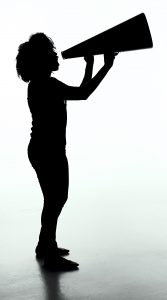
The Call for Speakers for Big Talk From Small Libraries 2023 is now open!
This free one-day online conference is tailored for librarians from small libraries; the smaller the better!
Small libraries of all types – public, academic, school, museum, special, etc. – are encouraged to submit a proposal. We’re looking for seven 50-minute presentations and four 10-minute “lightning round” presentations.
Do you offer a service or program at your small library that other librarians might like to hear about? Have you implemented a new (or old) technology, hosted an event, partnered with others in your community, or just done something really cool? The Big Talk From Small Libraries online conference gives you the opportunity to share what you’ve done, while learning what your colleagues in other small libraries are doing.
Here are some possible topics to get you thinking:
- Unique Libraries
- Special Collections
- New buildings
- Fundraising
- Improved Workflows
- Staff Development
- Advocacy Efforts
- Community Partnerships
- That great thing you’re doing at your library!
Submit your proposal by Friday, December 16, 2022.
Speakers from libraries serving fewer than 10,000 people will be preferred, but presentations from libraries with larger service populations will be considered.
Big Talk From Small Libraries 2023 will be held on Friday, February 24, 2023 between 8:45 a.m. and 5:00 p.m. (CT) via the GoToWebinar online meeting service. Speakers will present their programs from their own desktops. The schedule will accommodate speakers’ time-zones.
This conference is organized and hosted by the Nebraska Library Commission and is co-sponsored by the Association for Rural & Small Libraries.
Photo by Patrick Fore on Unsplash
NCompass Live: Retirement: Time to Ease on Down, Ease on Down the Road
Are you planning for retirement? We’ll explore why, when, and how to retire on next week’s NCompass Live webinar, ‘Retirement: Time to Ease on Down, Ease on Down the Road’ on Wednesday, September 7 at 10am CT.
Over the course of your career, you spend quite a bit of time planning your professional development, envisioning your career path, and deciding on the degrees or training you need in your professional life. Conversely, how much time do you spend planning a transition away from that life in a healthy, graceful manner? Join us for an exploration of why, when, and how to retire, and hear best practices and wish-I-hadn’ts based on recent retiree’s experiences. We will include transitioning to a fixed income, implementing a succession plan at your library, and adapting to life as a retiree.
Presenter: Robin Newell, Executive Director, Emporia Public Library, KS.

Upcoming NCompass Live shows:
- Sept. 14 – Building Cultures of Reading with Reader Zone
- Sept. 21 – Letters About Literature 2022
- Sept. 28 – Pretty Sweet Tech
- Oct. 5 – NO NCOMPASS LIVE THIS WEEK – ENJOY NLA!
- Oct. 12 – Navigating the New NebraskAccess
For more information, to register for NCompass Live, or to listen to recordings of past events, go to the NCompass Live webpage.
NCompass Live is broadcast live every Wednesday from 10am – 11am Central Time. Convert to your time zone on the Official U.S. Time website. The show is presented online using the GoToWebinar online meeting service. Before you attend a session, please see the NLC Online Sessions webpage for detailed information about GoToWebinar, including system requirements, firewall permissions, and equipment requirements for computer speakers and microphones.
Cataloging Audio Recordings
**Courses are open only to Nebraska residents or those who are employed by a Nebraska library.**
From vinyl records, 8-track tapes, and cassettes, various forms of audio recordings have been included in library collections. Those who attend this course will learn how to catalog audio recordings, particularly audio books, and music, on cassette or CD.
This class will be held online from October 10th to November 18th In order to receive full credit, all assignments must be completed by November 20th.
Class participants will access the course website in order to read materials, discuss issues in a forum, and complete assignments. The class is held asynchronously, which means that participants are not required to be online at any particular time during the six weeks. The instructor will interact with the participants during the course to offer feedback and provide explanations of the material.
A few days before the class starts, class participants will be sent information about accessing the class.
To receive full credit, participants must complete all assignments AND you must receive a 75%, or above, for the course.
This class is approved for the NLC Cataloging Certification Program.
Prerequisite: Library staff with some knowledge of MARC records and cataloging rules, preferred that the attendee has completed the Understanding Marc course.
To register: Go to Cataloging Audio Recordings in the Nebraska Library Commission Training Portal. Registration closes October 2nd.
Posted in Education & Training
Tagged Audio, Cataloger, cataloging, cataloging certificate, Continuing Education, education
Leave a comment
NCompass Live: Pretty Sweet Tech – WordPress Layout Walkthrough: From the Blank Page
Learn new techniques to create custom WordPress layouts on next week’s NCompass Live webinar, on Wednesday, August 31 at 10am CT..
Special monthly episodes of NCompass Live! Join the NLC’s Technology Innovation Librarian, Amanda Sweet, as she guides us through the world of library-related Pretty Sweet Tech.
The most common WordPress question I have been getting is: “how do you make custom WordPress layouts from the ground up?” This session is for anyone who wants to design a website without the layout restrictions that happen with pre-defined themes. This will be a WordPress & Elementor plugin demonstration/ tutorial that you can revisit to learn these different techniques:
- Building a color palette using coolors.co
- Using alternating color block layouts.
- Adding a Shape Divider between sections to add flair.
- Building custom images for the web with Canva (for free).
- Responsive two-column layouts
- Responsive card style layouts
- Responsive font-sizes for headers and paragraphs
If you want to learn new techniques with some of the lesser-known Elementor features, this is the session for you! I will be taking requests for technique demos as time permits. I hope to see you there!

Upcoming NCompass Live shows:
- Sept. 7 – Retirement: Time to Ease on Down, Ease on Down the Road
- Sept. 21 – Letters About Literature 2022
- Sept. 28 – Pretty Sweet Tech
- Oct. 5 – NO NCOMPASS LIVE THIS WEEK – ENJOY NLA!
For more information, to register for NCompass Live, or to listen to recordings of past events, go to the NCompass Live webpage.
NCompass Live is broadcast live every Wednesday from 10am – 11am Central Time. Convert to your time zone on the Official U.S. Time website. The show is presented online using the GoToWebinar online meeting service. Before you attend a session, please see the NLC Online Sessions webpage for detailed information about GoToWebinar, including system requirements, firewall permissions, and equipment requirements for computer speakers and microphones.
Posted in Education & Training, Pretty Sweet Tech
Tagged elementor, NCompLive, prettysweettech, WordPress
Leave a comment
NCompass Live: Team Up with Your Community!
Learn some amazing ways rural librarians can ‘Team Up with Your Community!’ on next week’s NCompass Live webinar, on Wednesday, August 24 at 10am CT..

We all know teamwork makes the dream work, but obstacles big and small can keep us from doing as much collaborative work as we’d like. Based on results of the IMLS-funded HEAL (Healthy Eating and Active Living) at the Library via Co-Developed Programming, you’ll learn some of the amazing ways rural librarians are already teaming up with everyone from regional hospitals to passionate individuals to make their communities healthier, more inclusive places. This highly interactive session will include community conversations about your experiences teaming up with others – with the ultimate goal of creating a publicly accessible, real world toolkit to help rural librarians do more by leveraging the power of partnerships.
Presenter: Noah Lenstra, Assistant Professor of Library and Information Science, University of North Carolina Greensboro.
Upcoming NCompass Live shows:
- Aug. 31 – Pretty Sweet Tech – WordPress Layout Walkthrough: From the Blank Page
- Sept. 7 – Retirement: Time to Ease on Down, Ease on Down the Road
- Sept. 21 – Letters About Literature 2022
- Sept. 28 – Pretty Sweet Tech
- Oct. 5 – NO NCOMPASS LIVE THIS WEEK – ENJOY NLA!
For more information, to register for NCompass Live, or to listen to recordings of past events, go to the NCompass Live webpage.
NCompass Live is broadcast live every Wednesday from 10am – 11am Central Time. Convert to your time zone on the Official U.S. Time website. The show is presented online using the GoToWebinar online meeting service. Before you attend a session, please see the NLC Online Sessions webpage for detailed information about GoToWebinar, including system requirements, firewall permissions, and equipment requirements for computer speakers and microphones.
NCompass Live: E-Rate 101 – Just the Basics
What is E-rate? How can my library benefit from E-rate? How do I apply for E-rate? Bring all of your E-rate questions to ‘E-rate 101: Just the Basics’, next week’s NCompass Live webinar, on Wednesday, August 17 at 10am CT.
E-rate is a federal program that provides discounts to schools and public libraries on the cost of their Internet Access and Connections to make these services more affordable. This includes Broadband, Fiber, and Wi-Fi Internet access as well as Internal Connections, such as wiring, routers, switches, and other network equipment.
This session will be a general overview of the E-rate program and will be useful to libraries who have never applied for E-rate, libraries who are new to E-rate, and current E-rate libraries who just want a short refresher on what E-rate is all about.
IMPORTANT NOTES: The dates and rules in this session will be specific to E-rate Funding Year 2023. Full in-depth E-rate workshops will be held later in the year.
Presenter: Christa Porter, Nebraska’s State E-rate Coordinator for Public Libraries, Nebraska Library Commission.
Upcoming NCompass Live shows:
- Aug. 24 – Team Up with your Community!
- Aug. 31 – Pretty Sweet Tech – WordPress Layout Walkthrough: From the Blank Page
- Sept. 7 – Retirement: Time to Ease on Down, Ease on Down the Road
- Sept. 21 – Letters About Literature 2022

For more information, to register for NCompass Live, or to listen to recordings of past events, go to the NCompass Live webpage.
NCompass Live is broadcast live every Wednesday from 10am – 11am Central Time. Convert to your time zone on the Official U.S. Time website. The show is presented online using the GoToWebinar online meeting service. Before you attend a session, please see the NLC Online Sessions webpage for detailed information about GoToWebinar, including system requirements, firewall permissions, and equipment requirements for computer speakers and microphones.
